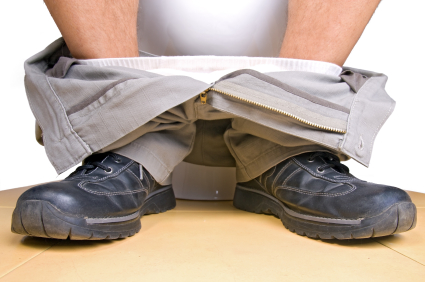Lessons from the loo.

Click here to listen to the broadcast of You Tell Me on KTBB AM 600, Friday, March 16, 2012.
According to a story on CBS TV Channel 3 in Philadelphia, some city buildings could soon be shut down in Trenton, New Jersey because of a toilet paper shortage. According to Harold Hall, the city’s public works director, they’re down to 15 rolls at city hall. The city council in the cash-strapped town voted down a resolution to authorize the purchase of more toilet paper because included in the bid was a supply of paper cups that the council doesn’t think the city can afford.
So Trenton’s public works director said, in effect, “Blow off the cups.” The city’s legal department said, in effect, “We can’t. The cups are part of a bid and in order to change the bid, the process of awarding it must start all over.”
So for those with business at city hall the choices are hold it or drip dry or…well, you know.
Trenton is a city of only 85,000 and yet it is a.) broke and b.) so bureaucratically hidebound that it can’t readily decide to not buy something; in this case paper cups.
Thus the purchase of a simple commodity like toilet paper is more than the state capital of the 11th most populous state in the union can manage in a timely fashion.
Forgive me if I persist in bringing you these stories but persist I must. I feel a profound obligation to point out, at every opportunity, how faith in government as protector and provider is misplaced. Every time I hear one of these stories I want to say to my liberal friends, “See? Government doesn’t work very well. It can’t buy toilet paper, for crying out loud. How can government take care of your health and see to your every temporal need if it can’t even buy toilet paper for a small-town city hall?”
If you think I’m just picking an aberrational story and using it in an opportunistic way to support my prejudices, fine. But humor me for just a minute anyway.
Try to imagine the bureaucratic gridlock of a city of fewer than 100,000 trying to procure toilet paper for a few city buildings scaled up to say, the size of the bureaucracy of an entire country trying to procure health care for 310 million citizens.
Imagine rather than the council of a cash-strapped city trying to afford toilet paper that it’s instead a federally-appointed panel of a cash-strapped nation trying to afford chemotherapy, statin drugs and mammograms. And beta blockers and pacemakers and insulin pumps. And MRI units and CT scanners and ultrasound machines. And colonoscopies, PSA tests and lipid panels. Imagine this panel wrestling with covering the costs of the millions upon millions of individual transactions that take place every day in an industry that comprises fully one sixth of the world’s largest economy.
Try to imagine the Byzantine processes of that bureaucracy. And then try to imagine that instead of merely being inconvenienced at city hall when visiting the loo, you are instead subjected to the anxiety of waiting for the bureaucrats to grant you access to the resources necessary to determine the exact nature of that lump in your breast or that cough that won’t go away.
Imagine that picture as vividly as you can and then hold that mental picture up alongside observable real-world experience. Consider Social Security that is paying out more than it is taking in. Visualize Medicare on the brink of financial collapse. See the reality of a postal system that will run out of cash by Halloween. Embrace the stark reality of VA hospitals that would embarrass a third world country. Take a ride on Amtrak. Go, if you dare, and transact business with any federal agency.
And then ask yourself; By what magic will nationalized health care in the United States — by far the biggest, most expensive and most complex social program in world history — turn out differently?








Another excellent column. The number of cities crashing and burning will be a wonder to behold over the next few years. For now, maybe we should send toilet paper care packages to Trenton–but no paper cups!
Petty Politicians acting like children; “I’ll show you!”. When will the American Public tire of these idiots and kick them to the side of the road where they belong. At present, all petty bureaucrats feel empowered because of Obama and his crew of Left Wing Radicals and Socialists. Locally, this is personafide by Duell’s recent actions, the election of our current Speaker and the two faced politicos who were elected because of the Conservative front and then turned their backs on us.
I long for the day of the Citizen in office…term limits…honesty…Honor…and integrity. But, I am not holding my breath…I just work toward that goal.
Rick
I am with Rick on this…I,too, long for the day we can put ordinary citizens in charge, term limits are a MUST, for with term limits the others will come. No term limits and we sink back into this corrupt mess we are in. The government has NO business in OUR lives telling us what we can eat or not eat, what light bulbs to use or how much toilet paper we can use, especially when they can’t seem to be able to supply their needs themselves. I have never seen a good government program! Course, others may disagree with me on that but I have never seen the government do what private citizens can do for themselves and others when the government steps back and gets out of the way!
I agree that government is inefficient… but so is health care in America. Our current system is partly free enterprise, partly state-subsidized and overall highly inefficient, yet we resist any talk of reform and quickly label it “socialized medicine.”
You seem to suggest that anything other than what we have now in America is “socialized medicine.” Not so. Perhaps the United Kingdom is the closest that any “rich” country in the world is to “socialized medicine” but check out other “rich, free-market” countries and see what they have… (Switzerland, Taiwan, Germany, Japan, etc) they have systems based on free-market like ours that are twice as efficient at half (or less) the cost of what we have. The difference? Everyone is mandated to buy insurance (like we already do for autos). By doing so, it is cheaper for everyone and without pre-existing “loop holes” and everyone gets quality care.
Health care in America is doomed. It cannot survive unless Americans are willing to let people die who cannot afford health care. We despise “socialized medicine” (run by the government) yet we don’t want to lose medicare or medicade… we won’t even talk about the VA.
Wake up America! Stop bashing anybody who tries to fix it. I’ve always voted Republican but I’ve yet to see a Republican in office try to fix what we have. The only thing they seem to know to do is bash anyone who addresses the problem.